The Countries Portal.svg.png.webp) The marked territories on this global map are mostly of countries which are sovereign states with full international recognition (brackets denote the country of a marked territory that is not a sovereign state). Some territories are countries in their own right but are not recognized as such (e.g. Taiwan), and some few marked territories are disputed about which country they belong to (e.g. Kashmir) or if they are countries in their own right (e.g. Western Sahara (territory) or the state known by the same name). A country is a distinct part of the world, such as a state, nation, or other political entity. It may be a sovereign state or make up one part of a larger state. For example, the country of Japan is an independent, sovereign state, while the country of Wales is a component of a multi-part sovereign state, the United Kingdom. A country may be a historically sovereign area (such as Korea), a currently sovereign territory with a unified government (such as Senegal), or a non-sovereign geographic region associated with certain distinct political, ethnic, or cultural characteristics (such as the Basque Country). The definition and usage of the word "country" is flexible and has changed over time. The Economist wrote in 2010 that "any attempt to find a clear definition of a country soon runs into a thicket of exceptions and anomalies." Most sovereign states, but not all countries, are members of the United Nations. Countries are often associated with symbols such as flags or anthems; they may also evoke strong feelings of devotion and patriotism in their populations. The largest country by area is Russia, while the smallest is the microstate Vatican City. The most populous is India; Vatican City is the least populous. (Full article...)
|

.svg.png.webp)
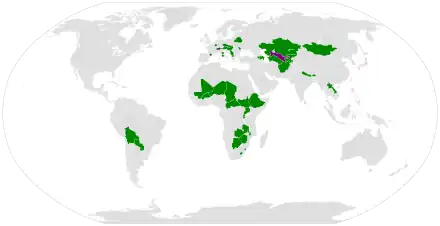
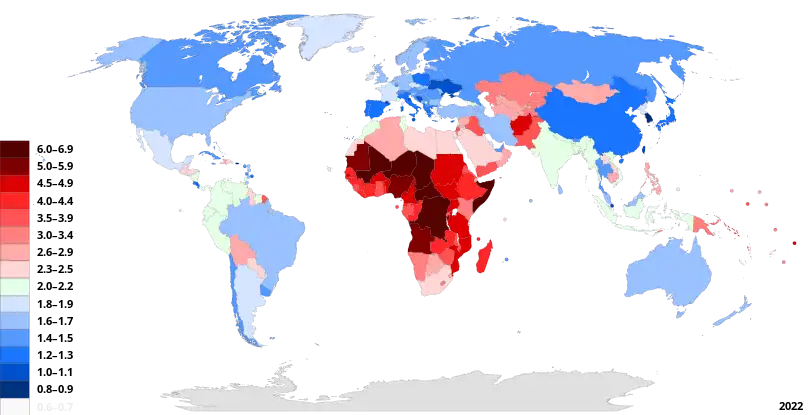
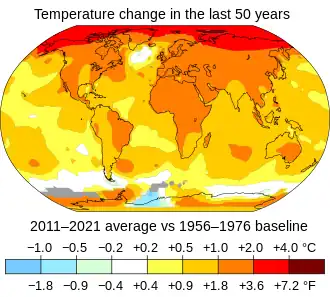

%252C_2018.jpg.webp)
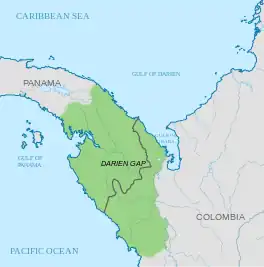

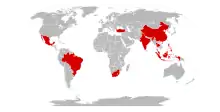
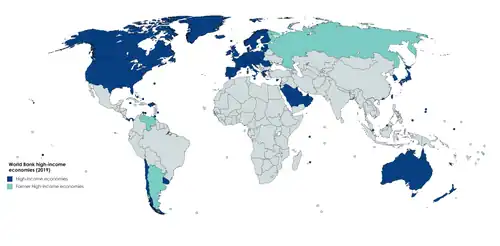
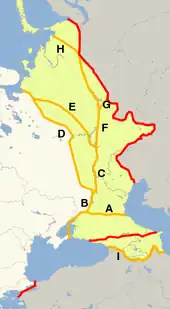
.svg.png.webp)



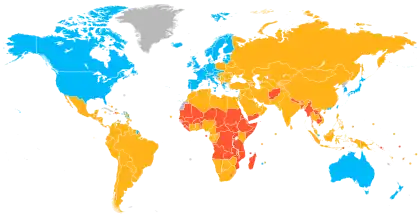
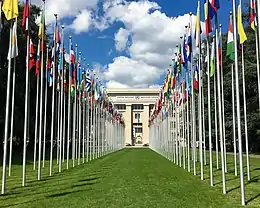
.svg.png.webp)

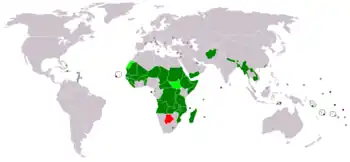


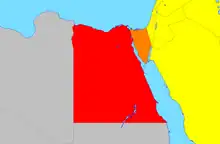

![Image 1Israel (/ˈɪzri.əl, -reɪ-/; Hebrew: יִשְׂרָאֵל Yisrāʾēl [jisʁaˈʔel]; Arabic: إِسْرَائِيل ʾIsrāʾīl), officially the State of Israel (מְדִינַת יִשְׂרָאֵל Medīnat Yisrāʾēl [mediˈnat jisʁaˈʔel]; دَوْلَة إِسْرَائِيل Dawlat Isrāʾīl), is a country in West Asia. It is bordered by Lebanon to the north, by Syria to the northeast, by Jordan to the east, by the Red Sea to the south, by Egypt to the southwest, by the Mediterranean Sea to the west, and by the Palestinian territories – the West Bank along the east and the Gaza Strip along the southwest. Tel Aviv is the financial, economic, and technological center of the country, while its seat of government is in its proclaimed capital of Jerusalem, although Israeli sovereignty over East Jerusalem is unrecognized internationally. With a population of nearly 10 million people, Israel is the only country where Jews constitute a majority of the population.Israel is located in the Southern Levant, a region known historically as Canaan, Palestine, and the Holy Land. In antiquity, it was home to several Israelite and Jewish kingdoms, including Israel and Judah and Hasmonean Judea, and is referred to as the Land of Israel in Jewish tradition. Over the ages, the region was ruled by powers such as the Assyrians, Babylonians, Achaemenids, Greeks, and Romans. During Roman rule, Jews became a minority in Palestine. The region later came under Byzantine and Arab rule. In the Middle Ages, it was part of the Islamic Caliphates, the Crusader Kingdom, and the Ottoman Empire. The late 19th century saw the rise of Zionism, a movement advocating for the establishment of a Jewish homeland, during which the Jewish people began purchasing land in Palestine. Under the British Mandate placed by the League of Nations after World War I, Jewish immigration to the region increased considerably, leading to tensions between Jews and the Arab majority population. The UN-approved 1947 partition plan triggered a civil war between these two peoples. The British terminated the Mandate on 14 May 1948, and Israel declared independence on the same day.On 15 May 1948, the armies of five neighboring Arab states invaded the area of the former Mandatory Palestine, starting the First Arab–Israeli War. An armistice in 1949 left Israel in control of more territory than the U.N. partition plan had called for; and no new independent Arab state was created as the rest of the former Mandate territory were held by Egypt and Jordan, respectively the Gaza Strip and the West Bank. The conflict resulted in the expulsion or flight of over 700,000 Palestinian Arabs from Israeli territory to neighboring countries, over eighty percent of the total. Over the next two decades after its independence, the majority of Jews from the Arab world emigrated, fled, or were expelled, with Israel absorbing approximately 650,000 of them. The 1967 Six-Day War resulted in the Israeli occupation of the Palestinian territories of the West Bank and Gaza Strip, along with the Egyptian Sinai Peninsula and the Syrian Golan Heights. Israel has since effectively annexed both East Jerusalem and the Golan Heights, and has established settlements across the occupied territories, actions which violate international law. Since the 1973 Yom Kippur War, Israel has signed peace treaties with Egypt, returning the Sinai Peninsula, and with Jordan, and more recently normalized relations with several Arab countries, though efforts to resolve the Israeli–Palestinian conflict have not succeeded. Israel's practices, in the longest military occupation in modern history, have drawn international condemnation for violating the human rights of Palestinians. (Full article...)](../I/Blank.png.webp)